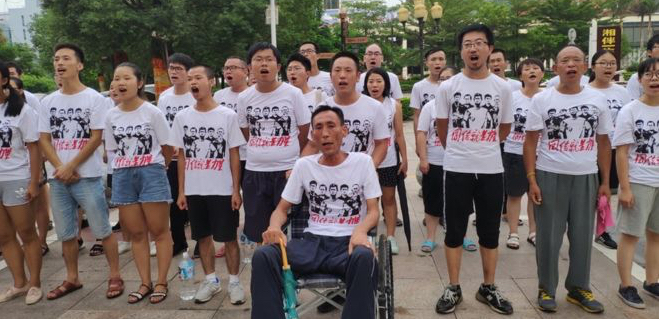A group of workers in China’s manufacturing hub of Shenzhen tried something very rare this summer—they attempted to follow the legal process to set up a union.
University students lent tremendous support. But their employer and the Chinese government cracked down on both the workers and the students with firings, detention, surveillance, and the threat of jail sentences.
Workers at the welding-equipment manufacturer Shenzhen Jasic Technology initiated the process of forming a union in May. Among their biggest complaints were arbitrary fines and the company’s underpayment into government-run funds that help workers pay rent or buy houses.
Workers followed the law in setting up a union, including requesting and receiving permission from upper-level unions affiliated with the government-controlled All-China Federation of Trade Unions, the only unions authorized in China.
In response to a rising tide of labor disputes, since the mid-2000s the ACFTU has built up more workplace branches, especially in foreign-invested firms, through a top-down effort. But these unions are notoriously ineffective at representing workers, focusing instead on organizing recreational activities and providing small holiday gifts. They mainly serve to preempt organizing.
Moreover, many companies are still not unionized, including Jasic, which is listed on the Shenzhen stock exchange. The company employs 1,000 workers at this factory.
'WE ARE LIKE TINY BUGS’
After workers collected signatures to form a union, in July the district-level union federation and the company denounced their effort as illegal—since the company had quickly formed a union to forestall the workers’ effort.
Jasic changed the job duties of union supporters and fired six of the most vocal. On July 20 the sacked workers attempted to return to work, but were beaten up and taken to the police station. Twenty other workers and supporters who went to the police station to protest were also arrested.
“The boss owns billions of yuan [equivalent to hundreds of millions of U.S. dollars] while we toil all year long just to make 20 to 30 thousand [$3,000-$4,000],” said a former Jasic worker in a speech at the protest. “What’s wrong to ask for a raise and get back the illegal deductions from our wages?”
Addressing the police, the former worker added, “When the boss says we’re making trouble, you, the cops, trust them and rush to the factory, beat us up and take us to the police station... In your eyes we are just like tiny bugs waiting to be stepped on.”
IN THE SPOTLIGHT
The Jasic workers’ struggle has attracted significant attention in China.
Their demand to set up a union is much less common than demands for raises, payments into pension insurance, or compensation related to factory shutdowns or relocations, which have been the focal points of thousands of labor disputes in China in recent years.
Of the 1,745 collective actions by workers listed on China Labor Bulletin’s strike map between September 2017 and August 2018, the Jasic struggle is the only one over organizing a union.
Publicity through Chinese social media platforms has overcome the mainstream media blackout on strikes and labor disputes in the increasingly repressive political environment under President Xi Jinping.
As they learned of the struggle, workers from other factories and university students from throughout the country rushed to Shenzhen to support the Jasic workers. “Students today are workers tomorrow,” said a student from Beijing at one protest. “People asked me why I am here. I asked them back, ‘How can I not be here?’”
CRACKDOWN
Disturbed by the outpouring of support, on July 27 the government arrested 29 Jasic workers and supporters, accusing them of “picking quarrels and provoking trouble,” a criminal charge often used by the government to suppress protests.
In response, workers and students formed a support group to demand that the government release all the detainees and respect the workers’ right to unionize. Thousands of workers and students signed online petitions.
Xinhua News, the government’s mouthpiece, has attempted to scapegoat two labor NGOs (similar to worker centers in the U.S.)—Shenzhen-based Dagongzhe and Hong Kong-based Worker Empowerment—for the workers’ actions. The government arrested a staff member and the registered agent of Dagongzhe. In 2015, the Chinese government launched a crackdown on groups like these, smearing them as foreign-funded organizations attempting to undermine the country’s stability.
Before dawn on August 24, riot police with full gear and shields broke into the apartment where members of the support group were staying and arrested more than 50 students and workers.
On the same day, two workers involved in the support group and two activists from the website “Pioneer,” which had been releasing frequent updates on the struggle, were arrested in Beijing.
CALL FOR SOLIDARITY
Most of the detainees have since been released, but four Jasic workers are still in prison awaiting trial on criminal charges. Two workers from other factories and six activists are still in detention and at high risk of facing criminal charges too.
Meanwhile the released student supporters have been disciplined by their universities and are under police surveillance at home.
Many of those detained have been denied the right to meet with their lawyers. The government has also constantly harassed and threatened lawyers willing to represent them. A number of lawyers were warned by authorities that those involved in the case would be putting their legal licenses at risk.
Solidarity actions have been organized in Hong Kong, Germany, and the U.S. You can sign the petition calling for the release of the arrested workers and students at bit.ly/jasicsolidarity.
Elaine Hui is a professor at the School of Labor and Employment Relations at Penn State University.







